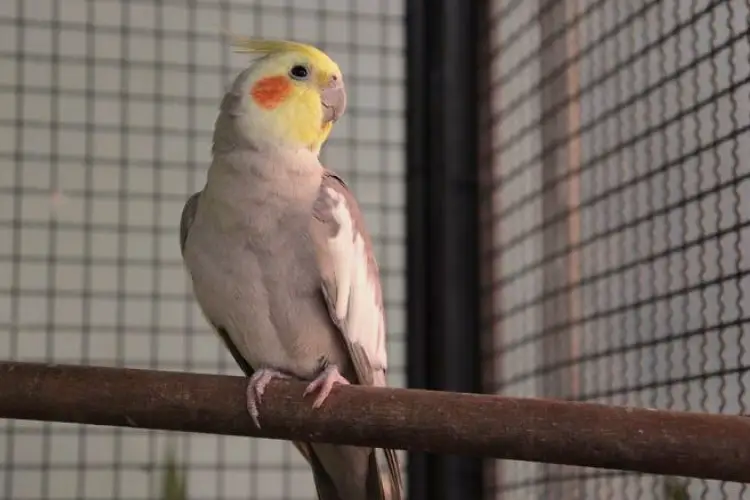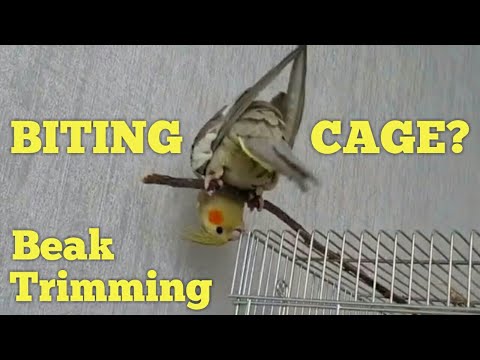As a cockatiel owner, you will notice a lot of strange behaviors from your bird. So you must observe and learn what the behaviors mean. That way, you can differentiate between normal and unusual behavior. One of the cockatiel’s behaviors is biting its cage. Let’s look at that.
What does it mean when cockatiels bite their cages? There are a few reasons why your cockatiel might bite its cage. One is to get your attention and tell you that it wants to get out of its cage. The cockatiel will also bite its cage when it is grooming its beak and when there is no other thing to play with inside the cage.
We will look at all the reasons why the cockatiel bites its cage and how to stop the cockatiel from biting its cage.
Why Do Cockatiels Bite Their Cages?
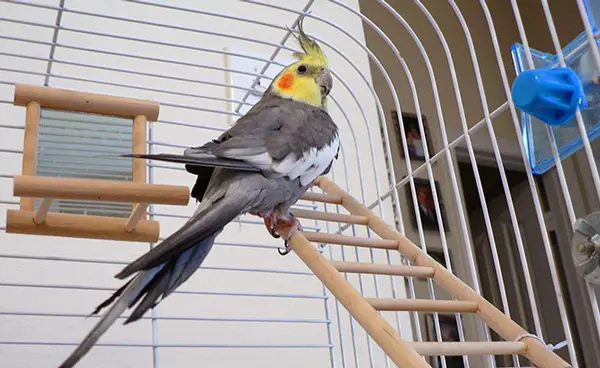
Cockatiels will bite their cages due to the following reasons:
Attention
If your cockatiel wants your attention, it will continuously bite its cage. It may be because the cockatiel is not comfortable in its cage or it wants to go outside. It will keep grinding its cage as a way to get out.
Grooming
As the cockatiel grows, so does its beak. So the cockatiel will use the cage’s bars to trim and remove overgrown flakes from its beak. However, if the cockatiel chews the cage bar too often, it can harm its beak.
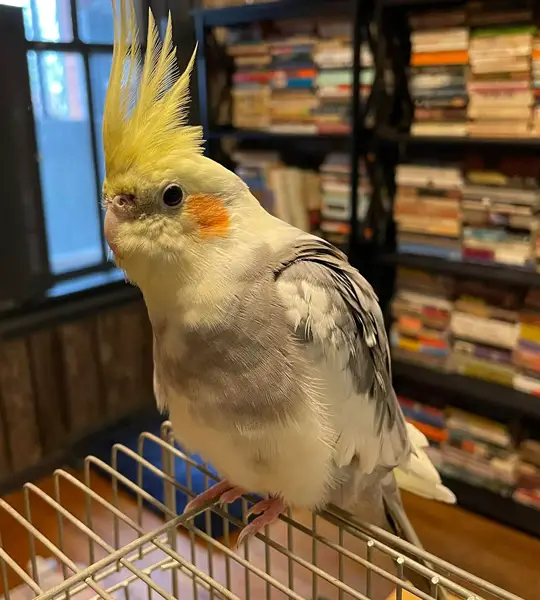
Boredom
Cockatiels are very social and intelligent birds. So at times, they must be mentally stimulated by having toys or a partner to play with. The cockatiel will start chewing the cage’s bars if neither is available.
Furthermore, if you establish a routine for your bird to go outside and then discontinue it, the cockatiel will attempt to chew its way out of its cage.
Natural behavior
In the wild, cockatiels chew on wood barks, shred materials for their nests and gather sticks to mark their territory. So, even in captivity, the cockatiel is still naturally inclined to chew on materials, which will be the cages’ bars.
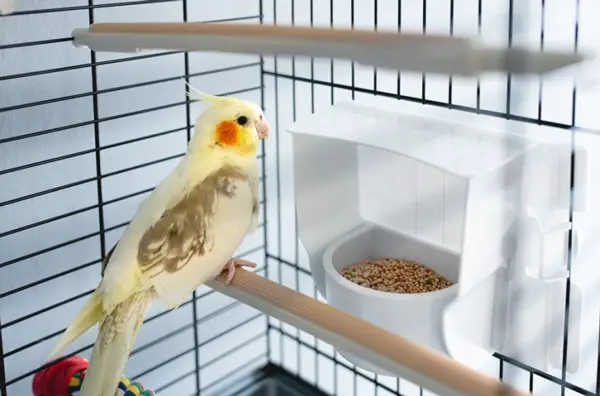
Nutritional reasons
Cockatiels may bite their cage to retrieve pieces of stuck food such as fruit remains. In such a case, the cockatiel will eat the remains and stop biting the cage. If the cockatiel does not stop, it means that its diet is lacking in minerals. This is common for female cockatiels, which need high amounts of calcium during the egg-laying season.
Stress
A cockatiel may be stressed due to a lack of sleep or exercise. If you take your bird outside where it can fly around then abruptly stop, the cockatiel will chew the cage bars in an attempt to escape.
Also, if the cockatiel is not getting enough sleep at night, it will get cranky during the day. A cockatiel might also be stressed due to hunger.
Fear
Many reasons can cause a cockatiel to be scared. It may be loud noises, sudden movements, night frights, the presence of a predator, new surroundings, and bullying. A scared cockatiel will bite through the cage bars to try to escape from danger.
How Do I Help A Cockatiel That Bites Its Cage?
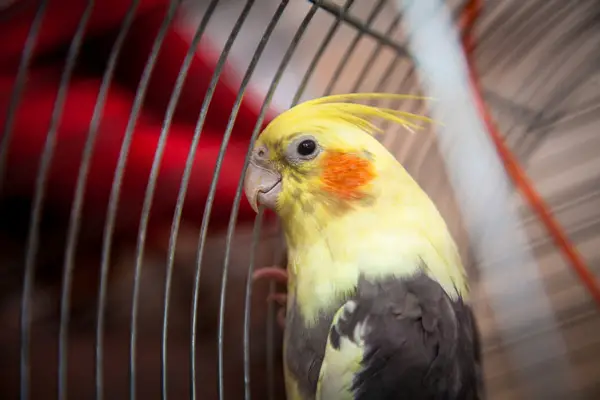
There are several ways you can stop a cockatiel from biting its cage. They include:
- Spend time with your cockatiel. Social interaction is a significant part of your cockatiel’s life. Add another cockatiel in the cage if you cannot adjust your schedule.
- Ensure the cockatiel has access to food and water throughout. Refill the food bowl daily. As for the water, you can change it every three days.
- Put the cockatiel’s cage in a room with little or no noise, especially at night. That way, your cockatiel can get the rest it needs at night. For the lights, turn them off at night, so the cockatiel gets to have 12 hours of darkness, as recommended by avian veterinarians.
- Try to purchase a large cage that can fit a hanging gym or swing set. The cockatiel will use these items to exercise.
- If possible, you can take the cockatiel outside and play with it. That will strengthen your bond with your bird. You can also teach cockatiel tricks and how to solve puzzles.
- For grooming, you can provide the cockatiel with chewable toys, natural perches, or cuttlebone that it can use to trim the beak. You can also give the cockatiel an apple or pear branch. In the wild, cockatiels groom and preen each other, so adding another cockatiel might help too.
- Provide female cockatiels with cuttlebone, which will supplement their diet with additional calcium, especially during the breeding season.
- Add toys and puzzles in its cage to keep your cockatiel mentally stimulated. You can rotate the toys every week to keep the cockatiel engaged.
- Try and remove any stress or fear triggers near the cockatiels. Ensure you keep the cage in a calm environment away from other pets. You can also cover the cockatiel’s cage at night to help them sleep better without distractions.
Also read: Why Is My Cockatiel Shaking or Shivering?
Can Biting The Cage Be Harmful To Cockatiels?
It is not harmful to them because it harms their beaks. Cockatiels have powerful beaks that can chew and bite without being damaged. Instead, it is dangerous because the cockatiel can consume toxins by biting painted cage bars. Paint is toxic and can make the cockatiel very sick.
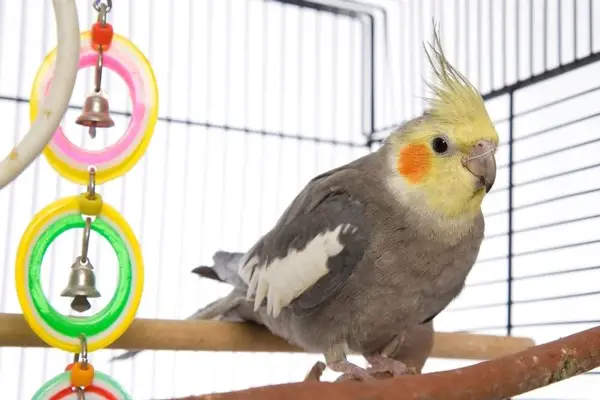
When purchasing a cage, choose one made of aluminum or steel. These cages do not peel off, so it will be safe even if your cockatiel bites the cell.
Video Of Cockatiel Biting Its Cage
Here is a video of a cockatiel biting the bars of its cage.
FAQs
Here are other related questions cockatiel owners might ask.
It is normal. Cockatiels bite branches in the wild, and that behavior persists in captivity. However, you must understand why your cockatiel is biting its cage. It may try to communicate that it is hungry or bored at times.
Cockatiels cannot damage the cage. Although a cockatiel’s beak is powerful, it is not powerful enough to cause damage to its cell. It is best to buy a steel or aluminum cage because they are the strongest and last the longest.
Related: Are Cockatiels Louder Than Budgies?
Conclusion
Cockatiels are very social and will bite their cages to get your attention if they feel ignored. It could also be due to hunger, a lack of minerals, boredom, or when grooming. Cockatiels bite the cage because they bite and chew on branches and other various materials in the wild.
